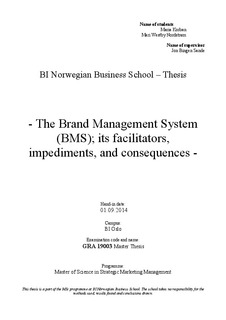The brand management system (BMS) : its facilitators, impediments, and consequences
Master thesis

View/
Date
2015-08-07Metadata
Show full item recordCollections
- Master of Science [1621]
Abstract
Several empirical findings have emphasized the strategic benefits for
organizations that possess strong brands. Frequently mentioned advantages are the
positive influence that brands have on evaluations of customers, and investors.
Acknowledging the importance of brands and that these intangible resources of a
firm are contingent upon adequate recognition and support (M’zungu, Merrilees,
and Miller 2010) - recent studies have investigated how the brand management
system (BMS), i.e., a “basic internal management infrastructure” (Santos-Vijande,
Belén, Suárez-Álvarez, and Díaz-Martín 2013, 148) enhances customer
performance, which in turn positively impacts business performance (Santos-
Vijande et al. 2013; Lee, Park, Baek, and Lee 2008).
Though research has investigated how brands should be managed internally to
increase their value, none has examined how antecedents in the external and
internal environment of an organization can destruct or facilitate the development
of the BMS. This is what the current study contributes to. We believe that more
knowledge, and understanding of the possible impediments and facilitators of the
BMS can help companies in the process of its development, and ultimately
improve their performance.
By the use of path analysis, with 101 decision-makers from the Norwegian food
processing industry as participants, this study particularly addresses that
significant facilitators of the BMS are: formalization, market orientation,
reputational assets, and short-term orientation, whereas a significant impediment
is specialization. Additionally, this study addresses that the key variables of
market orientation, and short-term orientation have a significant and positive
impact on a firm’s customer performance, whereas innovativeness, and
specialization exert a negative impact on this performance variable. Lastly, this
study confirms the important, and positive relationship between the BMS, and
customer performance – and where customer performance in turn has a direct
influence on business performance.
Description
Masteroppgave(MSc) in Master of Science in Strategic Marketing Management - Handelshøyskolen BI, 2015